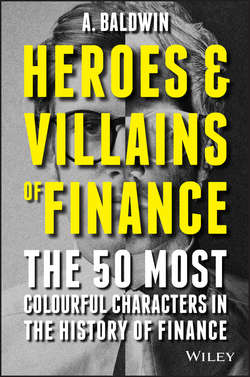Читать книгу Heroes and Villains of Finance - Baldwin Adam - Страница 6
На сайте Литреса книга снята с продажи.
02 CHANAKYA
Оглавлениеc.370–283 BC
As the ‘pioneer economist of India', Chanakya was one of the earliest and greatest contributors ever to the development of economics and political science. Living c. 370–283 BC, Chanakya was a professor of political science at the Takshashila University, and was later to become the chief architect of the Mauryan empire.
Often referred to as the ‘Indian Machiavelli', Chanakya compiled many of his economic and political ideas into his book Arthashashtra, which due to its harsh political pragmatism is widely considered a precursor to Machiavelli's The Prince. Standing as arguably the first systematic book on economics, the Arthashashtra discusses numerous theories, such as monetary and fiscal policies, welfare and ethics, economic management, international relations and war strategies. Many of the topics that Chanakya introduced in the book are still prevalent in modern economics.
Chanakya believed in the power of an autocracy for effective management of an economy, with a solid legal system needing to be observed in order for an economy to thrive.
Perhaps the first person to visualize the concept of a ‘nation', Chanakya's teachings offer a bureaucratic framework for the management of a society. Chanakya taught that ‘artha' (sound economies) has paramount importance for the duties and obligations of a king.
“HENCE THE KING SHALL BE EVER ACTIVE IN THE MANAGEMENT OF THE ECONOMY. THE ROOT OF WEALTH IS [ECONOMIC] ACTIVITY AND LACK OF IT [BRINGS] MATERIAL DISTRESS. IN THE ABSENCE OF [FRUITFUL ECONOMIC] ACTIVITY, BOTH CURRENT PROSPERITY AND FUTURE GROWTH WILL BE DESTROYED.”
CHANAKYA FROM THE ARTHASHASTRA
Legend has it that one night whilst working Chanakya was visited by a Chinese traveller. Chanakya immediately extinguished the oil lantern that he was working with and lit another. When the Chinese traveller asked if it was an Indian custom to do so, Chanakya is said to have responded “No my dear friend. There is no such custom. Actually, when you entered, I was working. It was an official work, pertaining to my empire, my nation. The oil filled in that lamp has been bought from the money from the National Treasury. Now, I am talking to you. This is a personal and friendly conversation, not related to my nation; so I cannot use the lamp now, as it will lead to wastage of the money of the National Treasury. Hence, I extinguished that lamp and lit this other lamp, since the oil in this lamp has been bought from my personal money.”
“TAXATION SHOULD NOT BE A PAINFUL PROCESS FOR THE PEOPLE. THERE SHOULD BE LENIENCY AND CAUTION WHILE DECIDING THE TAX STRUCTURE. IDEALLY, GOVERNMENTS SHOULD COLLECT TAXES LIKE A HONEYBEE, WHICH SUCKS JUST THE RIGHT AMOUNT OF HONEY FROM THE FLOWER SO THAT BOTH CAN SURVIVE. TAXES SHOULD BE COLLECTED IN SMALL AND NOT IN LARGE PROPORTIONS.”
Chanakya FROM THE ARTHASHASTRA
